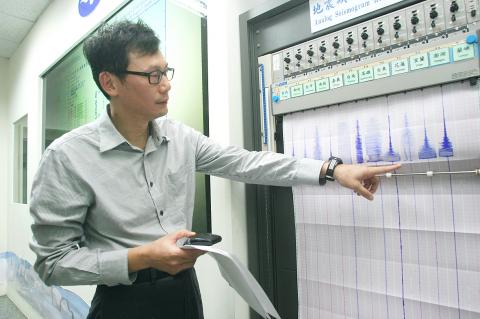A magnitude 6.3 earthquake jolted eastern Taiwan at 8:02pm yesterday, with tremors being felt across the whole nation, the Central Weather Bureau said.
There were no immediate reports of injury or damage, though two people were reported trapped in elevators in a building in New Taipei City’s (新北市) Sijhih District (汐止).
Firefighters extracted both of them.

Photo: CNA
The bureau said the earthquake’s center was in Hualien County’s Ruisui Township (瑞穗), about 52.9km south of Hualien County Hall at a depth of 19.5km.
The US Geological Survey gave a slightly higher magnitude of 6.6 and a shallower depth of 9km.
“Buildings in Hualien and most cities shook for about a minute,” an official with the bureau’s Seismology Center said.
Two High-Speed Rail trains were halted, but the system later resumed normal operations.
Hsinchu Science Park, where many of the nation’s high-tech firms are headquartered, did not receive any reports of damage, Hsinchu Science Park Administration deputy director-general Tu Chi-hsiang (杜啟祥) said.
The strongest tremor had an intensity of 6 in Ruisui’s Hongye Village (紅葉), the bureau said.
It said an intensity of 5 was recorded in Nantou and Yilan counties, 4 in Chiayi, Taitung and Taoyuan counties and New Taipei City, 3 in Taipei and Greater Taichung, and Yunlin, Changhua, Miaoli, Pingtung and Hsinchu counties, and 2 in Greater Kaohsiung and Greater Tainan.
It was the third inland earthquake of magnitude 6 or higher this year. The previous ones occurred in Nantou County — a magnitude 6.2 quake on March 27 and a magnitude 6.5 quake on June 2.

MORE VISITORS: The Tourism Administration said that it is seeing positive prospects in its efforts to expand the tourism market in North America and Europe Taiwan has been ranked as the cheapest place in the world to travel to this year, based on a list recommended by NerdWallet. The San Francisco-based personal finance company said that Taiwan topped the list of 16 nations it chose for budget travelers because US tourists do not need visas and travelers can easily have a good meal for less than US$10. A bus ride in Taipei costs just under US$0.50, while subway rides start at US$0.60, the firm said, adding that public transportation in Taiwan is easy to navigate. The firm also called Taiwan a “food lover’s paradise,” citing inexpensive breakfast stalls

TRADE: A mandatory declaration of origin for manufactured goods bound for the US is to take effect on May 7 to block China from exploiting Taiwan’s trade channels All products manufactured in Taiwan and exported to the US must include a signed declaration of origin starting on May 7, the Bureau of Foreign Trade announced yesterday. US President Donald Trump on April 2 imposed a 32 percent tariff on imports from Taiwan, but one week later announced a 90-day pause on its implementation. However, a universal 10 percent tariff was immediately applied to most imports from around the world. On April 12, the Trump administration further exempted computers, smartphones and semiconductors from the new tariffs. In response, President William Lai’s (賴清德) administration has introduced a series of countermeasures to support affected

CROSS-STRAIT: The vast majority of Taiwanese support maintaining the ‘status quo,’ while concern is rising about Beijing’s influence operations More than eight out of 10 Taiwanese reject Beijing’s “one country, two systems” framework for cross-strait relations, according to a survey released by the Mainland Affairs Council (MAC) on Thursday. The MAC’s latest quarterly survey found that 84.4 percent of respondents opposed Beijing’s “one country, two systems” formula for handling cross-strait relations — a figure consistent with past polling. Over the past three years, opposition to the framework has remained high, ranging from a low of 83.6 percent in April 2023 to a peak of 89.6 percent in April last year. In the most recent poll, 82.5 percent also rejected China’s

PLUGGING HOLES: The amendments would bring the legislation in line with systems found in other countries such as Japan and the US, Legislator Chen Kuan-ting said Democratic Progressive Party (DPP) Legislator Chen Kuan-ting (陳冠廷) has proposed amending national security legislation amid a spate of espionage cases. Potential gaps in security vetting procedures for personnel with access to sensitive information prompted him to propose the amendments, which would introduce changes to Article 14 of the Classified National Security Information Protection Act (國家機密保護法), Chen said yesterday. The proposal, which aims to enhance interagency vetting procedures and reduce the risk of classified information leaks, would establish a comprehensive security clearance system in Taiwan, he said. The amendment would require character and loyalty checks for civil servants and intelligence personnel prior to